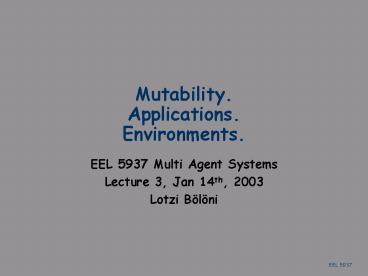Mutability' Applications' Environments' - PowerPoint PPT Presentation
1 / 18
Title:
Mutability' Applications' Environments'
Description:
EEL 5937. Bond and agent surgery. Project started at Purdue, ... EEL 5937. Grid computing. New paradigm for distributed computing. Similar to the electric grid ... – PowerPoint PPT presentation
Number of Views:20
Avg rating:3.0/5.0
Title: Mutability' Applications' Environments'
1
Mutability.Applications.Environments.
- EEL 5937 Multi Agent Systems
- Lecture 3, Jan 14th, 2003
- Lotzi Bölöni
2
Mutability
3
Why mutability?
- Some applications
- Mobile agents, while traversing heterogeneous
platforms might need to adapt - Remotely building up monitoring agents
- Future
- Continuous updating of long-lived agents
- Self-repair, self-debug
- Genetic algorithms for agent design
4
Bond and agent surgery
- Project started at Purdue, currently at UCF
- http//bond.cs.ucf.edu
- Agent described by a data structure (multiplane
state machine). - Agent can be described with a language
(Blueprint) which can also describe agent surgery - Agent surgery controlled modifications on a
running (!) agent
5
Applications
6
Electronic commerce
- User interface agents on e-commerce sites
- Bidding agents
- Controversy
- Acting on behalf of the customer?
- On behalf of the seller?
- No mechanisms for guaranteeing loyalty of agents
7
Spacecraft control
- The ground crew is usually required to track the
spacecrafts progress and decide how to deal with
eventualities - Remember the control room for the Apollo moon
missions? - Expensive
- Very long reaction time if the spacecraft is far
- NASA is investigating making the probes more
autonomous - Example Deep Space 1
8
Virtual communities
- Agents as placeholders for user
- Temporarily
- Permanently
- Avatars
- Virtual corporations
- Consumer management agents
- Economic recession slowed down innovation
- Massively multiplayer role playing games
- E.g. Everquest, Asherons Call etc.
- As many times, gaming community is in the
technical forefront. - We will see many of these ideas going into the
virtual corporations
9
Grid computing
- New paradigm for distributed computing
- Similar to the electric grid
- Providers and consumers. Contracts, requests,
resource management - Popular in the scientific computing community
- Has the potential to become a widespread approach
- If we manage the complexity of use
- Agent approach useful to manage the resources on
behalf of the user
10
And many others
- Military applications
- Health care
- Intelligent home, intelligent car
- maybe you will propose the next one?
11
Conclusion
- Many interesting research issues
- Many interesting business opportunities
- Agent technology image hurt by many marketing
pushes without significant technology behind them - But real advances were made
12
Environments, events, actions
13
Environments, events and actions
- The agents live in an environment
- The operating system
- The internet
- The world of Quake
- For an AIBO robot the home of the owner
- The battlefield
- The environment is usually not fixed. It is
changing through events and actions. - Events changes in the environment, for which we
do not know the source. - Actions changes in the environment whose source
is the agent or another known entity - We usually consider events and actions to be
discrete in time and space.
14
Environments Accessible vs. inaccessible
- An accessible environment is one in which the
agent can obtain complete, accurate, up-to-date
information about the environments state. - Most moderately complex environments (including
for example, the everyday physical world and the
Internet) are inaccessible. - The more accessible the environment is, the
simpler it is to build agents to operate in it.
15
Environments Deterministic vs. non-deterministic
- A deterministic environment is one in which any
action has a single guaranteed effect. There is
no uncertainty about the state that will result
from performing an action. - Operating in a non-deterministic environment
means that we need to verify the result of our
actions. - Deterministic environment
- Single program computing environment with strong
reservations and optimism - Non-deterministic
- The physical world
- The internet
- Multi-agent systems
16
Environments Static vs. dynamic
- A static environment is one that can be assumed
to remain unchanged except by the performance of
actions by the agent - A dynamic environment independent changes happen
(events, actions of other agents). - A physical world is a highly dynamic environment.
- Some computer environments can be made static,
but the interesting ones are dynamic.
17
Environments Episodic vs. non-episodic
- In an episodic environment, the performance of an
agent is dependent on a number of discrete
episodes, with no link between the performance of
the agent in different scenarios. - Episodic environments are simpler, because the
agent developer can ignore the long term history
of the agent. - Example
- A battery powered robot lives in a non-episodic
environment.
18
Environments Discrete vs. continuous
- An environment is discrete is there are a fixed
finite number of entities and percepts in it
(e.g. a chess game) - Continuous no isolatable entities, events as
analog change etc. (e.g. the ocean) - Discussion
- Computers are usually perceived as discrete.
- Nature is usually perceived as continuous, at
least at the macro level. - We can usually isolate actions, because they are
performed by the agent - Isolating events is more difficult.































